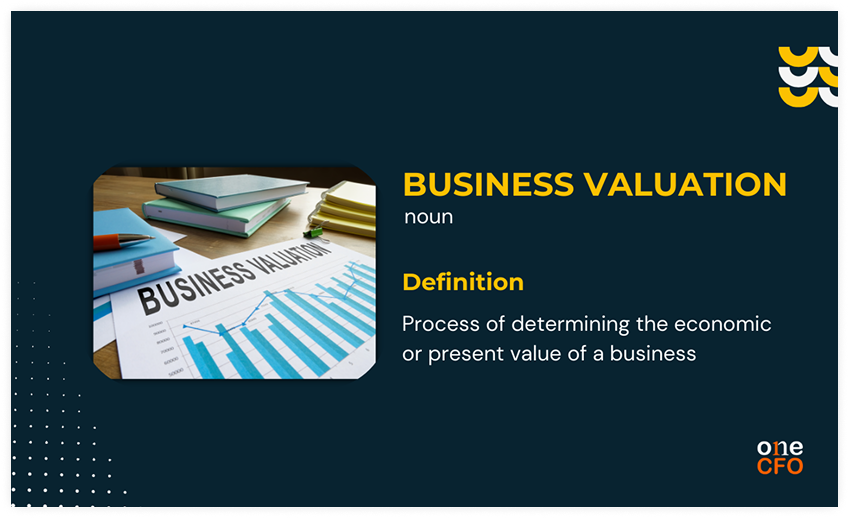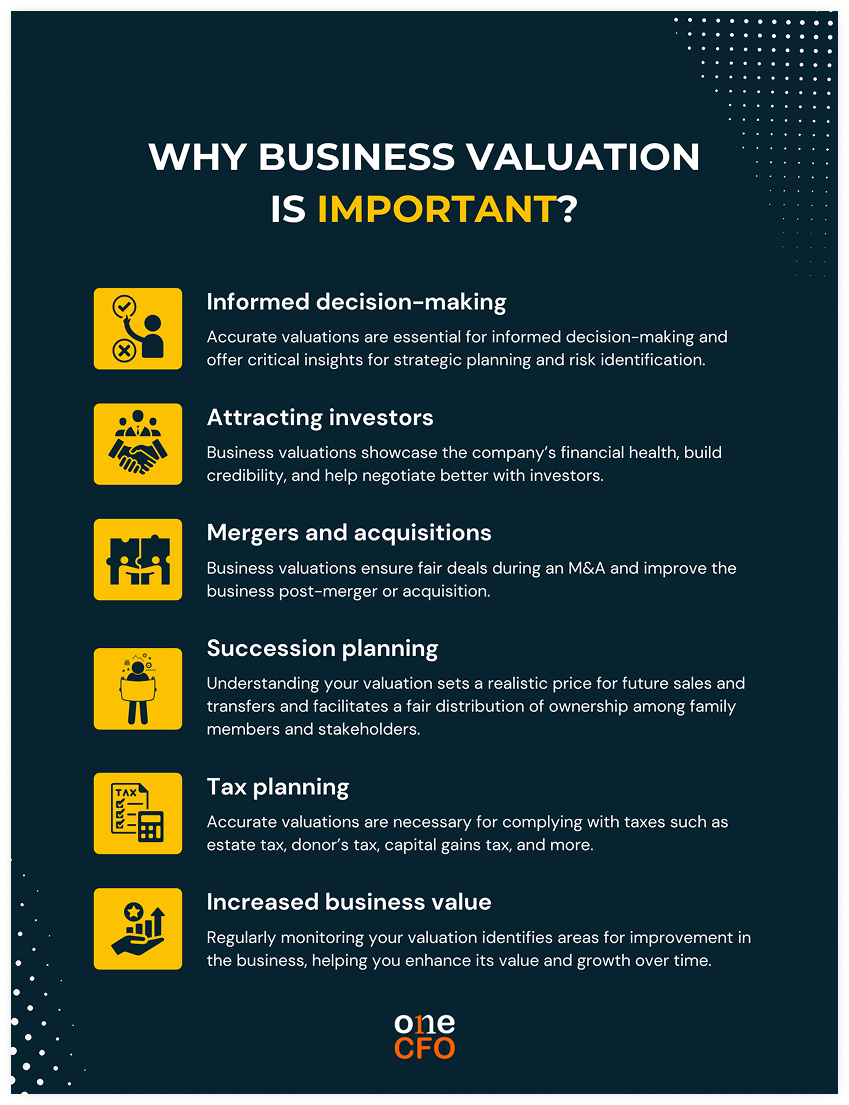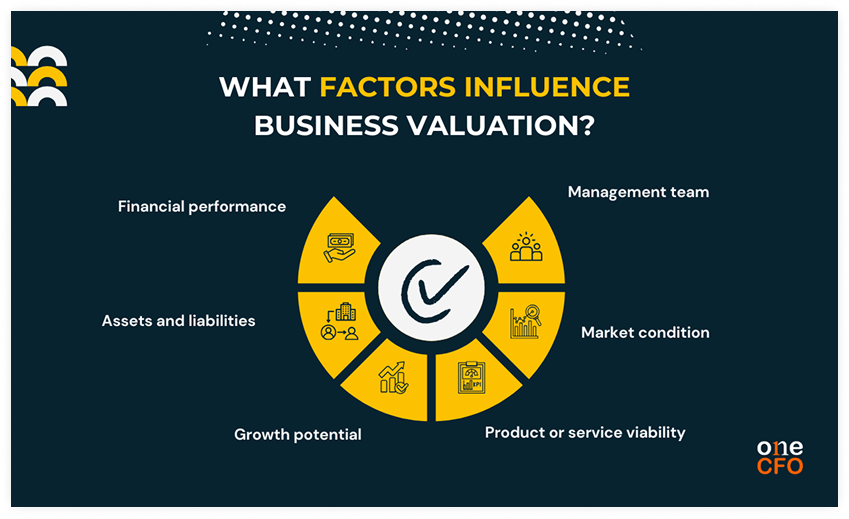
March 20, 2025 | 9:23 pm
Table of Contents
What's the true value of your business? It's a question every entrepreneur should ask, yet
often overlooked. Accurately determining your business valuation is key to securing your
company’s future.
Business valuation isn't just a number. It provides a strategic compass, guiding you through
crucial decisions like fundraising, mergers, or even a future sale. By understanding your
business's worth, you gain the leverage to capitalize on growth potential and avoid costly
missteps.
Read on to learn more about business valuation and discover the key reasons why having a
valuation is essential to gaining clarity on your company’s true worth.
What is a business valuation?

Business valuation, or company
valuation, is the process of determining a business's
economic value. This business appraisal thoroughly analyzes financial and non-financial
aspects to assess the company’s current worth.
Learning what the company is worth as a business owner can help better negotiate mergers,
acquisitions, fundraising, estate planning, and more.
Business valuation also serves as a reality check for entrepreneurs. Valuations objectively
assess your business’s worth and remove any biases you have.
Why is business valuation important?

The importance of business valuation lies in its ability to bring clarity to your company's
worth. This crucial process reveals your business's actual value and guides essential
decisions.
Discover the top reasons why you should get a business valuation:
Informed decision-making
A business valuation isn’t just about arriving at a single figure. It's a deep dive into the
heart of your company's financial story - transforming raw data into actionable
intelligence.
The business valuation process comprehensively analyzes key metrics, such as revenue
streams, cash flow patterns, and overall financial health, to provide critical insights for
making informed decisions.
By leveraging the insights from a thorough valuation, entrepreneurs make strategic choices
that directly align with their company's financial realities. This isn't guesswork; it's
decision-making grounded in tangible, verifiable information.
Additionally, the comprehensive view of financial health provided by the valuation process
helps identify potential risks before they escalate. Business owners can then develop
proactive mitigation plans.
The level of foresight business owners get also enables them to confidently pursue strategic
opportunities, optimize resource allocation, and achieve sustainable growth.
Attracting investors
When you start reaching out to potential investors, they’ll want to
see your business's
updated valuation. Knowing how much your business is worth helps investors assess the
company’s financial health and how much they can get in return.
Proper valuation documentation makes your business more credible and appealing to investors.
Such a document provides transparency around your business, which instills confidence in
prospective investors.
Business valuations also serve as a negotiation baseline since they establish your company's
fair market value, considering your financial
performance and the current market.
For instance, if your valuation shows your business is worth a specific value, you can use
this figure to justify your asking price or ask for better investment terms.
If you’d like to learn more about attracting investors or how to raise funds for your
business, check out this video:
Mergers and acquisitions
Business valuations are indispensable when undergoing mergers and acquisitions (M&A).
When your business gets involved in an M&A, valuing your business is crucial in structuring
a fair and successful deal between companies.
Without a proper valuation, buyers may attempt to offer a lower price for your company,
making it challenging to negotiate better terms.
As a business owner, you must demonstrate your company’s worth. Valuations help with that by
providing an objective assessment that ensures neither party overpays or undervalues the
business.
During M&A, a business valuation ensures sellers receive a fair price for the deal. For
buyers, it can determine if they can afford the deal or if the acquisition aligns with their
financial strategy.
Succession planning
Planning for the business’s future involves its growth and how you want to pass it on.
Succession planning is incredibly essential, especially for family or closely held
businesses.
When planning succession, business owners transfer ownership to a family member or employee
or sell it to a strategic buyer. Regardless of who the successor is, having an accurate
business valuation at hand is essential to ensure a fair and equitable transition.
A business valuation justifies your selling price or how you fairly distribute shares among
the heirs or partners. This is especially helpful if some successors want to cash out since
the valuation can set a fair buyout price.
If you decide to sell your business, your business valuation can help set a realistic price
for the buyer. And even if you don’t plan to sell or transfer ownership, knowledge of your
valuation can encourage you to improve this value further for a more profitable handover.
Tax planning
An updated business valuation is necessary to comply with tax obligations during ownership
transfers, whether through selling, gifting, or succession.
In the Philippines, when a business owner passes away, the heirs must pay a 6% estate tax on
the net value of the inherited business.
Gifting or donating assets, including a business or stocks, is also subject to a 6% donor’s tax.
Other taxes that business owners may
need to consider when selling their businesses or
shares are value-added taxes (VAT), documentary stamp tax (DST), and capital gains tax
(CGT).
With all these taxes to consider, business owners should proactively get business valuations
during tax planning to help them prepare for these obligations.
Increased business value
Regularly monitoring your valuations helps you identify areas that could further increase
business value, which is highly beneficial if you plan to sell in the future or want to
attract investors.
By tracking business value, you can take strategic initiatives to enhance those areas, such
as improving your profitability and market position.
Business valuations also provide insights into your company’s strengths and weaknesses,
allowing you to focus your energy on projects that could boost your value. Setting goals and
targets that address these identified areas ensures your business grows and appreciates over
time.
What factors determine a business valuation?
The business valuation process is both an art and a science, especially as it blends financial and non-financial factors.

As entrepreneurs, it’s essential not only to know how much your company is worth but also to understand these factors that influence business valuation:
What are the consequences of inaccurate valuations?
Understanding your company valuation is extremely valuable to businesses. However, business
valuations aren’t done only once but must be updated regularly.
Using outdated valuations or not having a valuation at all can pose long-term consequences
for your business. Let’s talk about those risks:
Missed Opportunities
Inaccurate valuations of your business can have significant implications, leading to missed
opportunities and misguided strategies.
Overvaluing your business may drive away potential investors or partners due to unrealistic
expectations, while undervaluing it can cause you to accept offers far below their true
worth.
An inflated perception of your business's financial standing creates a gap between actual
performance and expectations, jeopardizing long-term sustainability. Conversely,
undervaluation diminishes your negotiating power, limiting your ability to secure favorable
deals and financial returns.
Ultimately, both overvaluation and undervaluation undermine confidence in your business.
This lack of clarity can deter investment and reduce growth potential, impacting your
company’s success.
Financial risks and instability
Another consequence of inaccurate valuations is the exposure of your business to financial
risks and instability.
With inaccurate valuations, business owners are likelier to have biased or uninformed views
of their company. This can lead to poor decision-making, including taking on too much debt,
insufficient funding, or
misallocating resources.
Failure to understand your business value can prevent you from recognizing early warning
signs of financial distress. This leaves your business more vulnerable to financial risks
and can keep you from reaching profitability.
For more tips on how to boost profitability for SMEs, watch this video:
Legal and tax implications
Neglecting to update your valuations can result in serious legal and tax consequences.
For example, disputes may happen among your shareholders, especially regarding
the company’s
value or how profits are shared.
In this instance, having an accurate and fair valuation is necessary to support arguments
and find a common resolution.
Outdated or inaccurate valuations can also lead to underpayment or overpayment of taxes,
especially in estate planning and business ownership transfers. Doing so can result in
audits or financial penalties, which add an unnecessary burden to your business.
Get your business valuation in a flash!
Business valuation is a powerful key that unlocks opportunities for your business. Whether
you plan to sell, seek investments, or enhance your strategic planning, understanding your
business value is critical to navigating these situations smoothly.
However, many SMEs and startups may find the process too complex and costly, mainly when
contacting large firms.
Fortunately, we have a solution for you. Enter isneek - the first free business valuation
tool in the Philippines!
isneek, powered by Valutico,
provides an initial indication of your company valuation. All
it takes is a simple questionnaire covering your essential business metrics and you get free
business valuation results within 15 minutes!
Take your free business valuation today and start planning for
the future of your business.
Keep in mind that isneek’s valuations rely on the accuracy of the information provided and
subjective assessments of future financial performance. In this context, the valuation
result shows indicative value that may differ from alternative perspectives.
Our fractional CFO experts can provide you with an in-depth, comprehensive valuation of your
business. Visit us at onecfoph.co or email us at [email protected]
Read our disclaimer here.